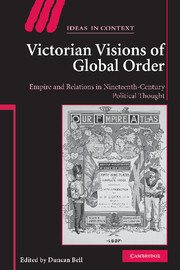 Victorian Visions of Global Order
Victorian Visions of Global Order Book contents
- Frontmatter
- Contents
- Contributors
- Chapter 1 Victorian visions of global order: an introduction
- Chapter 2 Free trade and global order: the rise and fall of a Victorian vision
- Chapter 3 The foundations of Victorian international law
- Chapter 4 Boundaries of Victorian international law
- Chapter 5 ‘A legislating empire’: Victorian political theorists, codes of law, and empire
- Chapter 6 The crisis of liberal imperialism
- Chapter 7 ‘Great’ versus ‘small’ nations: size and national greatness in Victorian political thought
- Chapter 8 The Victorian idea of a global state
- Chapter 9 Radicalism and the extra-European world: the case of Karl Marx
- Chapter 10 Radicalism, Gladstone, and the liberal critique of Disraelian ‘imperialism’
- Chapter 11 The ‘left’ and the critique of empire c. 1865–1900: three roots of humanitarian foreign policy
- Chapter 12 Consequentialist cosmopolitanism
- Index
- Ideas in Context
Chapter 9 - Radicalism and the extra-European world: the case of Karl Marx
Published online by Cambridge University Press: 22 September 2009
- Frontmatter
- Contents
- Contributors
- Chapter 1 Victorian visions of global order: an introduction
- Chapter 2 Free trade and global order: the rise and fall of a Victorian vision
- Chapter 3 The foundations of Victorian international law
- Chapter 4 Boundaries of Victorian international law
- Chapter 5 ‘A legislating empire’: Victorian political theorists, codes of law, and empire
- Chapter 6 The crisis of liberal imperialism
- Chapter 7 ‘Great’ versus ‘small’ nations: size and national greatness in Victorian political thought
- Chapter 8 The Victorian idea of a global state
- Chapter 9 Radicalism and the extra-European world: the case of Karl Marx
- Chapter 10 Radicalism, Gladstone, and the liberal critique of Disraelian ‘imperialism’
- Chapter 11 The ‘left’ and the critique of empire c. 1865–1900: three roots of humanitarian foreign policy
- Chapter 12 Consequentialist cosmopolitanism
- Index
- Ideas in Context
Summary
THE RADICAL CRITIQUE OF EMPIRE
The radical case against empire remained remarkably constant between Paine at the end of the eighteenth century and Hobson at the end of the nineteenth; and that included Marx. This was true, whether of its depiction of the colonists, its exposure of the corrupt arrangements between government and trading companies, its attack upon indefensible monopolies or its highlighting of the cost to the tax-payer. But Marx's attitude towards extra-European and pre-capitalist societies underwent a remarkable transformation between 1848 and the 1870s.
Among a small minority, there had been condemnation of the brutality and greed accompanying European exploration and conquest ever since the Spanish debate about the Conquistadors in the sixteenth century. But after 1750, criticism became both more comprehensive and more intense. This was in part the result of the beginnings of a sustained campaign against slavery, in part the result of a growing conviction that the Seven Years War of 1757–1763 – the first truly global conflict – had been ‘altogether a colony quarrel’. Two works in particular shaped the terms – moral, historical and economic – in which criticism would be made. The first was the Histoire des deux Indes, a collective work containing nineteen books, which first appeared under the name of the Abbé Raynal in 1772. The second, Adam Smith's Wealth of Nations, was first published in 1776.
- Type
- Chapter
- Information
- Victorian Visions of Global OrderEmpire and International Relations in Nineteenth-Century Political Thought, pp. 186 - 214Publisher: Cambridge University PressPrint publication year: 2007
- 22
- Cited by
